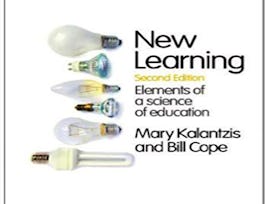What role does education play in achieving sustainable development goals? How can education drive transformative changes leading to environmentally and socially just societies? How can key stakeholders be involved in creating inclusive, equitable, and empowering learning environments that prepare individuals and communities for a rapidly changing world?



Empfohlene Erfahrung
Was Sie lernen werden
Understand India's education policy trajectory
Problematise the role of education in sustaining social inequalities
Deliberate on how education can be transformed to attain equitable, just, and sustainable futures
Kompetenzen, die Sie erwerben
- Kategorie: Critical Pedagogy
- Kategorie: Teacher Development
- Kategorie: Diversity Equity And Inclusion Initiatives
- Kategorie: Education Policy
- Kategorie: Critical Thinking
Wichtige Details

Zu Ihrem LinkedIn-Profil hinzufügen
Juli 2024
6 Aufgaben
Erfahren Sie, wie Mitarbeiter führender Unternehmen gefragte Kompetenzen erwerben.


Erwerben Sie ein Karrierezertifikat.
Fügen Sie diese Qualifikation zur Ihrem LinkedIn-Profil oder Ihrem Lebenslauf hinzu.
Teilen Sie es in den sozialen Medien und in Ihrer Leistungsbeurteilung.

In diesem Kurs gibt es 7 Module
In this introductory module, you will learn a few important details about the course, including the objectives of this course, who the instructors and the course team are, as well as important information to navigate the course. You will also find a link to a Pre-Course Survey – please do fill this as it will help us get to know you better and prepare the course accordingly.
Das ist alles enthalten
1 Video3 Lektüren1 Diskussionsthema1 Plug-in
In this module, you’ll become familiar with the development of the education system from Colonial India to Independent India and the continued impact of policy trajectories on school and teacher education. You will also have the opportunity to reflect on the potential role of teachers in achieving high-quality education.
Das ist alles enthalten
4 Videos1 Lektüre1 Aufgabe2 Diskussionsthemen
By the end of this module, you would develop some insight into how the concept of childhood evolved and how this understanding is critical to designing school curriculum and pedagogy. Engaging with the progression of the Right to Education Act would help in understanding how children’s rights are sought to be met in a plural and hierarchised society and how the role and accountability of the state is critical in safeguarding children's rights and their well-being.
Das ist alles enthalten
6 Videos1 Lektüre1 Aufgabe3 Diskussionsthemen
This module helps you recognise children as epistemic entities and the importance of encouraging children’s voice and agency in achieving their true potential. This module will assist you in cultivating capacities and dispositions to appreciate the diversity of children’s backgrounds and to integrate their lived experiences in the teaching-learning process.
Das ist alles enthalten
7 Videos1 Lektüre1 Aufgabe3 Diskussionsthemen
In this module, you will develop tools and capacities to understand, engage with and integrate diverse lived experiences of students in the teaching and learning process. You will be able to understand how formal schooling processes, communities, larger social and political contexts facilitate or hinder the inclusion of children in classrooms.You would also engage with ideas of decolonising school curriculum as part of a wider project of ‘decoloniality’ which implies dismantling relations of power and conceptions of knowledge that tend to reproduce hierarchies based on caste, gender, class, community, and region.
Das ist alles enthalten
8 Videos1 Lektüre1 Aufgabe3 Diskussionsthemen
This module of the course offers you opportunities to reflect upon the nuanced and deep influence that socio-cultural structures of class, caste, and community have on gender and how classroom pedagogy can be reinvented to equip teachers to become sensitive and socially responsive to the unequal nature of gender and to seek transformative pedagogies.
Das ist alles enthalten
6 Videos1 Lektüre1 Aufgabe3 Diskussionsthemen
In this final module, you will get the opportunity to check your understanding of all that you've learnt so far with the graded assessment in the form of a multiple-choice questionnaire. You will also hear from our instructors on what they hope the ideal key takeaways are for you from this course. Finally, please fill in the Post-course Survey – this will help us understand your journey during the course and improve it to make learning more meaningful.
Das ist alles enthalten
1 Video1 Aufgabe1 Plug-in
Dozenten


Empfohlen, wenn Sie sich für Education interessieren

University of Michigan

University of Illinois Urbana-Champaign

University of Michigan

University of Michigan
Warum entscheiden sich Menschen für Coursera für ihre Karriere?





Neue Karrieremöglichkeiten mit Coursera Plus
Unbegrenzter Zugang zu 10,000+ Weltklasse-Kursen, praktischen Projekten und berufsqualifizierenden Zertifikatsprogrammen - alles in Ihrem Abonnement enthalten
Bringen Sie Ihre Karriere mit einem Online-Abschluss voran.
Erwerben Sie einen Abschluss von erstklassigen Universitäten – 100 % online
Schließen Sie sich mehr als 3.400 Unternehmen in aller Welt an, die sich für Coursera for Business entschieden haben.
Schulen Sie Ihre Mitarbeiter*innen, um sich in der digitalen Wirtschaft zu behaupten.
Häufig gestellte Fragen
Access to lectures and assignments depends on your type of enrollment. If you take a course in audit mode, you will be able to see most course materials for free. To access graded assignments and to earn a Certificate, you will need to purchase the Certificate experience, during or after your audit. If you don't see the audit option:
The course may not offer an audit option. You can try a Free Trial instead, or apply for Financial Aid.
The course may offer 'Full Course, No Certificate' instead. This option lets you see all course materials, submit required assessments, and get a final grade. This also means that you will not be able to purchase a Certificate experience.
When you purchase a Certificate you get access to all course materials, including graded assignments. Upon completing the course, your electronic Certificate will be added to your Accomplishments page - from there, you can print your Certificate or add it to your LinkedIn profile. If you only want to read and view the course content, you can audit the course for free.
You will be eligible for a full refund until two weeks after your payment date, or (for courses that have just launched) until two weeks after the first session of the course begins, whichever is later. You cannot receive a refund once you’ve earned a Course Certificate, even if you complete the course within the two-week refund period. See our full refund policy.
 enthalten
enthalten
